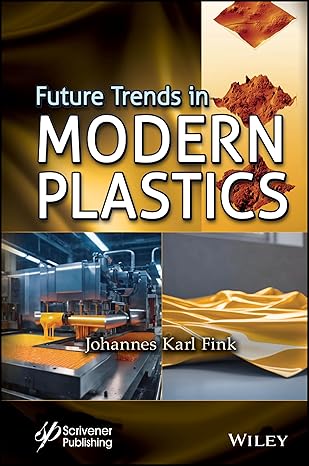 Future Trends in Modern Plastics
Future Trends in Modern Plastics
by: Johannes Karl Fink (Editor)
Publisher: Wiley
Publication Date: 23 May 2024
Language: English
Print Length: 320 pages
ISBN-10: 1394237545
ISBN-13: 9781394237548
Book Description
Future Trends in MODERN PLASTICSThe prolific author and polymer scientist discusses the current topics in the plastics industry and recommends future research in sustainable polymers and the recycling routes of plastic waste. The book opens with a chapter discussing newly developed monomers such as alkylene-based monomers, epoxide monomers, diol-based monomers, bio-based monomers, and several other types, Modern polymerization methods are then explained, such as ionic polymerization, plasma polymerization, and ring-opening polymerization. The book moves on to special issues and some future trends in the plastics industry with recommendations for future research. Plastics have given society enormous benefits because of their versatility, light weight, durability, and low costs. However, these properties have come with negative impacts because these persistent materials are leaked into the environment during their entire life cycle. Therefore, critical chapters report on the future directions for sustainable polymers, the valorization of plastic waste, and the recovery, treatment and recycling routes of plastic waste. The book concludes with chapters on the usage of plastics in medical devices, as well as the use of plastics in restoration, food applications, additive classes, and manufacturing. Audience The book will be used by plastics engineers, chemists, polymer and materials scientists in both academia and the plastics industry.
About the Author
From the Back Cover The prolific author and polymer scientist discusses the current topics in the plastics industry and recommends future research in sustainable polymers and the recycling routes of plastic waste. The book opens with a chapter discussing newly developed monomers such as alkylene-based monomers, epoxide monomers, diol-based monomers, bio-based monomers, and several other types, Modern polymerization methods are then explained, such as ionic polymerization, plasma polymerization, and ring-opening polymerization. The book moves on to special issues and some future trends in the plastics industry with recommendations for future research. Plastics have given society enormous benefits because of their versatility, light weight, durability, and low costs. However, these properties have come with negative impacts because these persistent materials are leaked into the environment during their entire life cycle. Therefore, critical chapters report on the future directions for sustainable polymers, the valorization of plastic waste, and the recovery, treatment and recycling routes of plastic waste. The book concludes with chapters on the usage of plastics in medical devices, as well as the use of plastics in restoration, food applications, additive classes, and manufacturing. Audience The book will be used by plastics engineers, chemists, polymer and materials scientists in both academia and the plastics industry. About the Author Johannes Karl Fink is Professor of Macromolecular Chemistry at Montanuniversität Leoben, Austria. His industry and academic career spans more than 30 years in the fields of polymers, and his research interests include characterization, flame retardancy, thermodynamics and the degradation of polymers, pyrolysis, and adhesives. Professor Fink has published many books on physical chemistry and polymer science including A Concise Introduction to Additives for Thermoplastic Polymers (Wiley-Scrivener 2009), The Chemistry of Biobased Polymers, 2nd edition (Wiley-Scrivener 2019), and 3D Industrial Printing with Polymers (Wiley-Scrivener 2019) and The Chemistry of Environmental Engineering (Wiley-Scrivener 2020).
未经允许不得转载:电子书百科大全 » Future Trends in Modern Plastics

